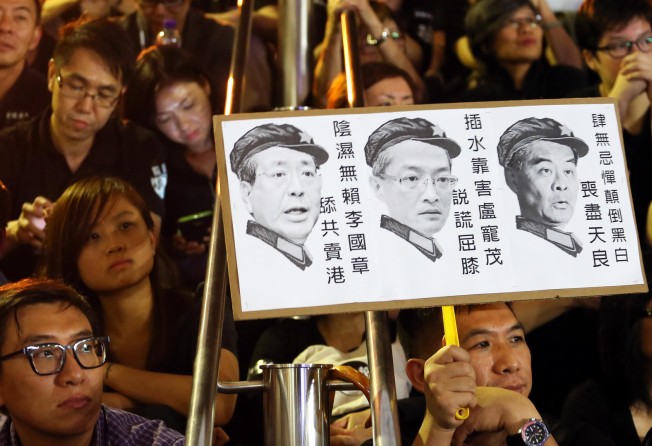Despite McCarthy-style witch-hunts, the University of Hong Kong council upheld academic freedom in vote on Johannes Chan
Lau Ping Cheung says the university council did the right thing to resist smear tactics and pressure by radicals that hark back to McCarthyism witch-hunts in the US

The concept of academic freedom can trace its origins back to the 19th century, when Prussia and Germany adopted a system that accorded universities autonomy in governance and freedom of academic development and research. The model was so successful that, by the late 19th century, it had been adopted by the likes of the US and China.
Fast forward to today, and academic freedom is making the headlines in Hong Kong, as radical students, academics and pro-democratic politicians rally to amend universities' ordinances with the aim of ousting the chief executive as de facto chancellor of all universities and changing the composition of university councils. This was triggered by a University of Hong Kong council decision not to appoint Professor Johannes Chan Man-mun as a pro-vice-chancellor. Radicals say, although they have no proof, that the chief executive put pressure on the council, undermining HKU's autonomy and academic freedom.
In fact, the chief executive's de facto chancellorship of all universities is both a legacy and a necessity. It is a colonial legacy, following the founding in 1911 of HKU, the city's first university, by the then governor Sir Frederick Lugard. Logically, therefore, he also became the first chancellor of the university. This tradition has continued. It is also a necessity because the eight public universities are heavily funded by taxpayers' money.
Another fact that has roused debate is that the external members of the HKU council currently outnumber university members. But HKU is not the one with such a structure. Harvard's equivalent of the HKU council, for instance, is made up of 30 external members and 14 internal members; at Stanford, just two of the 40-person council are internal members. However, it is true that in some universities, in the UK, for example, university members do outnumber those from outside.

There is no international standard for the composition of a university's council. However, in 2003, an independent review of HKU's governance recommended that "the ratio of external to university members should be about 2:1". The rationale is simple - HKU should have an open and wide world vision. HKU is part and parcel of Hong Kong society; its governance should be independent, unbiased and free of individual faculties' favouritism.
It is thus shallow, if not arrogant, for radicals, particularly academics themselves, to call for a high degree of self-governance for universities under the pretext of academic freedom and institutional autonomy, simply because they don't like the council's decision to reject Chan's appointment or because they dislike the present chancellor.
The fact that Chan openly boasted that he was the only candidate recommended by HKU's search committee and that student union president Billy Fung Jing-en revealed what he claimed were some members' views in a closed-door council meeting - when both matters were supposed to be confidential - were blatant interferences in institutional autonomy. Also worrying were the attacks and pressure being exerted on the council by radicals and some pro-democratic politicians.

These reckless and unsubstantiated attacks and accusations bring to mind McCarthyism. In the 1950s, "red scare" fearmongering was used by Republican US Senator Joseph McCarthy to stir people's fear of communism and alleged Russian spying, without any evidence. Thousands were persecuted, many imprisoned and some even died, often after verdicts based on inconclusive and vague evidence, most of which was later overturned.
Such smear tactics can be very effective, at least for a short while. Hong Kong is now shrouded in a mist of McCarthyism that is sabotaging many core values, including academic freedom. Luckily, the HKU council maintained its independent and unbiased position, saving the university's 104-year-old reputation. That, to me, is a true reflection of academic freedom and institutional autonomy.
Lau Ping Cheung is a member of the Economic Development Commission cum convenor of its working group on professional services